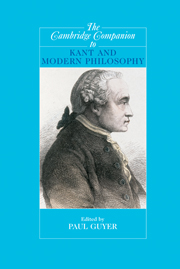Book contents
- Frontmatter
- Introduction: The starry heavens and the moral law
- 1 “A Priori”
- 2 Kant on the perception of space (and time)
- 3 Kant’s philosophy of mathematics
- 4 Kant on a priori concepts: The metaphysical deduction of the categories
- 5 Kant’s philosophy of the cognitive mind
- 6 Kant’s proofs of substance and causation
- 7 Kant and transcendental arguments
- 8 The critique of metaphysics: The structure and fate of Kant’s dialectic
- 9 Philosophy of natural science
- 10 The supreme principle of morality
- 11 Kant on freedom of the will
- 12 Mine and thine? The Kantian state
- 13 Kant on sex and marriage right
- 14 Kant’s theory of peace
- 15 Kant’s conception of virtue
- 16 Kant’s ambitions in the third Critique
- 17 Moral faith and the highest good
- 18 Kant’s critical philosophy and its reception - the first five years (1781-1786)
- Bibliography
- Index
5 - Kant’s philosophy of the cognitive mind
Published online by Cambridge University Press: 28 March 2007
- Frontmatter
- Introduction: The starry heavens and the moral law
- 1 “A Priori”
- 2 Kant on the perception of space (and time)
- 3 Kant’s philosophy of mathematics
- 4 Kant on a priori concepts: The metaphysical deduction of the categories
- 5 Kant’s philosophy of the cognitive mind
- 6 Kant’s proofs of substance and causation
- 7 Kant and transcendental arguments
- 8 The critique of metaphysics: The structure and fate of Kant’s dialectic
- 9 Philosophy of natural science
- 10 The supreme principle of morality
- 11 Kant on freedom of the will
- 12 Mine and thine? The Kantian state
- 13 Kant on sex and marriage right
- 14 Kant’s theory of peace
- 15 Kant’s conception of virtue
- 16 Kant’s ambitions in the third Critique
- 17 Moral faith and the highest good
- 18 Kant’s critical philosophy and its reception - the first five years (1781-1786)
- Bibliography
- Index
Summary
Kant's contributions to our understanding of the mind came largely in the course of pursuing other projects. The Critique of Pure Reason was intended to determine what we can know. In trying to answer that question Kant was led to consider what minds must be like to be capable of knowledge. His search for a sound basis for ethics included an investigation of the nature of a being who could be a morally responsible agent. He offered hypotheses about how observers appreciate beauty and sublimity in order to clarify the significance of the aesthetic appreciation of art and nature. By investigating what we could do or what he thought we could do, he developed theories about who or what we are.
The task of integrating the aspects of mind that Kant believed are required for knowledge, morality, and aesthetic sensibility in a consistent portrait of a subject has yet to be carried out. In this chapter, I focus exclusively on his depictions of the mind as a subject of knowledge in the Critique of Pure Reason. His theory of the active cognizer stands behind his most arresting philosophical doctrine, namely, the thesis that “we ourselves bring into the appearances that order and regularity in them that we call nature, and moreover we would not be able to find it there if we, or the nature of our mind, had not originally put it there” (Pure Reason, A 125).
- Type
- Chapter
- Information
- The Cambridge Companion to Kant and Modern Philosophy , pp. 169 - 202Publisher: Cambridge University PressPrint publication year: 2006
- 3
- Cited by



